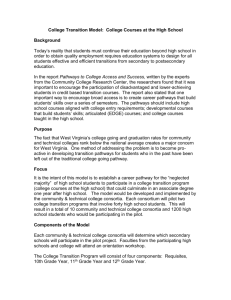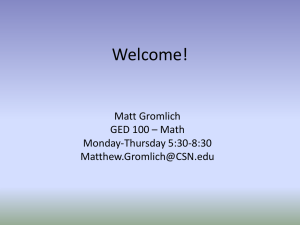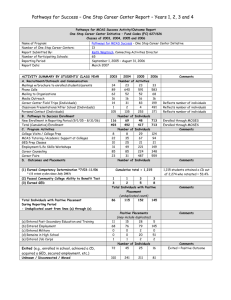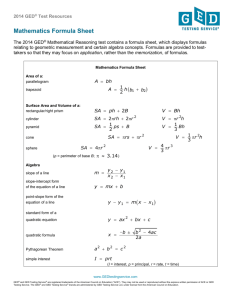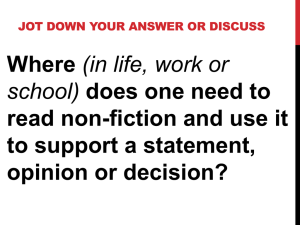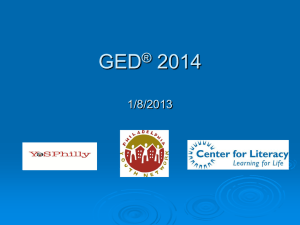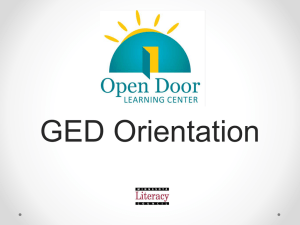Transition Programs in North Carolina
advertisement
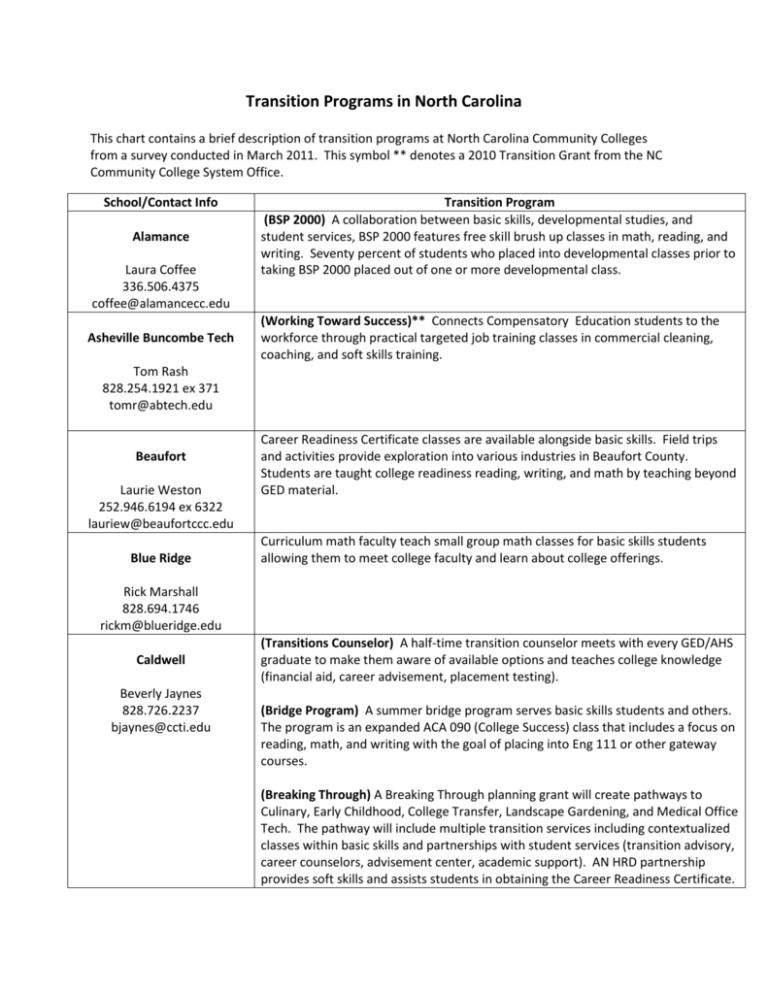
Transition Programs in North Carolina This chart contains a brief description of transition programs at North Carolina Community Colleges from a survey conducted in March 2011. This symbol ** denotes a 2010 Transition Grant from the NC Community College System Office. School/Contact Info Alamance Laura Coffee 336.506.4375 coffee@alamancecc.edu Asheville Buncombe Tech Transition Program (BSP 2000) A collaboration between basic skills, developmental studies, and student services, BSP 2000 features free skill brush up classes in math, reading, and writing. Seventy percent of students who placed into developmental classes prior to taking BSP 2000 placed out of one or more developmental class. (Working Toward Success)** Connects Compensatory Education students to the workforce through practical targeted job training classes in commercial cleaning, coaching, and soft skills training. Tom Rash 828.254.1921 ex 371 tomr@abtech.edu Beaufort Laurie Weston 252.946.6194 ex 6322 lauriew@beaufortccc.edu Blue Ridge Career Readiness Certificate classes are available alongside basic skills. Field trips and activities provide exploration into various industries in Beaufort County. Students are taught college readiness reading, writing, and math by teaching beyond GED material. Curriculum math faculty teach small group math classes for basic skills students allowing them to meet college faculty and learn about college offerings. Rick Marshall 828.694.1746 rickm@blueridge.edu Caldwell Beverly Jaynes 828.726.2237 bjaynes@ccti.edu (Transitions Counselor) A half-time transition counselor meets with every GED/AHS graduate to make them aware of available options and teaches college knowledge (financial aid, career advisement, placement testing). (Bridge Program) A summer bridge program serves basic skills students and others. The program is an expanded ACA 090 (College Success) class that includes a focus on reading, math, and writing with the goal of placing into Eng 111 or other gateway courses. (Breaking Through) A Breaking Through planning grant will create pathways to Culinary, Early Childhood, College Transfer, Landscape Gardening, and Medical Office Tech. The pathway will include multiple transition services including contextualized classes within basic skills and partnerships with student services (transition advisory, career counselors, advisement center, academic support). AN HRD partnership provides soft skills and assists students in obtaining the Career Readiness Certificate. (TRIO Partnership) TRIO programs are available at many community colleges and assist students with postsecondary entry and student supports. TRIO students created a special edition newspaper to help basic skills students learn about college expectations: http://www.cccti.edu/TRIO/SSS/documents/TRIOTribuneFall2009.pdf Basic skills students are also invited to monthly socials with TRIO staff and participants to learn more about college entry and TRIO support services. Cape Fear (Transition Specialist)** The Transition Specialist assists students with the college application, financial aid, and scholarship processes while serving as a liaison between basic skills, continuing education, and local employers. Erica Burnham 910.362.7178 eburnham@cfcc.edu Carteret Diane Matlock 252.222.6211 dmm@carteret.edu Catawba Valley Sandie Loyer 828.327.7000 ex 4352 sloyer@cvcc.edu Central Piedmont Kathi Polis 704.330.6976 Kathi.Polis@cpcc.edu (Jump Start) Students are referred to Jump Start based on low math college placement test scores. The class features an intensive 3 week review, frequent quizzes, and post testing with the college placement test. All students who persisted in the class during Summer 2010 placed into a higher developmental math class. (Bridge Classes) Bridge to Success courses in math and grammar/writing are available for students referred from ESL and GED classes, developmental classes, and the general public. The grammar/writing course allows students to build proficiency in basic grammar and fundamental writing skills. Students participate in lessons customized to their learning needs which include peer tutoring, cooperative learning, homework, and a cumulative exam. (Pathways to Employment) Pathways is a short-term program that provides academic, social, and job specific training designed to prepare students to enter the workforce as skilled employees. The program incorporates three integrated curriculum components: human resources, basic skills, and job-specific skills to prepare students for employment in one of nine different occupational areas, such as pharmacy technician, green construction, welding technology, and developmental disabilities. For more information, contact Lin Embrey at lindsey.embrey@cpcc.edu (ESL Technical Career Ladders) ESL Technical Ladders is a program designed for nonnative English language learners. The program reduces barriers to economic selfsufficiency by connecting students to education, job training and employment in high-demand industries. Students are able to access job training opportunities at any level of English proficiency. There are classes to accommodate a variety of English language levels, employability skills and career goals. Further, many of the Technical Career Ladder courses allow English language learning adults to obtain college credit toward a degree and/or obtain entry level jobs in a career. Scholarship funds are available from a private donor to assist with the tuition and fees of the occupational and/or curriculum coursework. For more information, contact Gilda Rubio-Festa at Gilda.Ruibo-festa@cpcc.edu College of The Albemarle Wanda Halstead 252.335.0821 ex 2314 whalstead@albemarle.edu (SPAN Class – Step it Up a Notch) A 6 week classroom based academic skills enrichment with college knowledge workshops. Classes are taught in math, study skills, and technology. The technology course covers Campus Cruiser and Moodle. GED/AHS graduates and pre-college students who have placed in developmental classes are recruited for the class. One of the SPAN instructors gives the college placement test and recruits low performing students. (TRIO Partnership) TRIO programs are available at many community colleges and assist students with postsecondary entry and student supports. During basic skills orientation, students are introduced to TRIO staff. TRIO staff build relationships with students and inform them of TRIO services. Students near GED/AHS completion meet with TRIO staff to gain assistance with their postsecondary transition. Craven The Continuing Education Occupational Extension Coordinator talks about the Career Readiness Certificate during orientation. Zeledith Blakely 252.638.1587 blakelyz@cravencc.edu Davidson Programs profiled in main section Durham Tech Program profiled in main section Edgecombe Jerry Harper 252.544.3521 harperj@edgecombe.edu Fayetteville Tech Kaira Bullock 910.678.8454 bullock@faytechcc.edu Forsyth Tech (Bridge Instruction) Bridge instruction, which includes preparing students for Career Readiness Certification and lessons from a contextualized instruction toolkit, prepares students for postsecondary education and job placement. The initiative also includes learning communities for both faculty and students. (AHS Basic Skills Transitions Course) An AHS Basic Skills Transitions Course bridges the gap between basic skills and postsecondary education and/or employment. Students learn test taking skills, better time management, improved organizational skills, and how to access available resources. Students also develop personal, educational, and career goals with the ability to map out a step-by-step plan to achieve their goals. A link to this AHS course syllabus can be found here Skilled Worker Model Transition Program is profiled in main section. Shannon Stanley 336.734.7708 ststanley@forsythtech.edu (BSP 050) Students with college placement test scores below developmental studies are automatic referrals to BSP 050, a bridge to college class. The class meets 9 hours a week for a semester and the curriculum allows students to review and develop the necessary skills for college placement test success. (Transitions Committee) A BSP Transitions Committee meets regularly to improve transition practices. Gaston Becky McLain 704.922.6352 mclain.rebecca@gaston.edu (MECA Transition Lab) A MECA (Microcomputer Evaluation of Careers & Academics) Transition Lab is available for all on-campus ABE, ESL, GED and AHS classes. MECA uses software and hands-on career exploration and assessment kits to assist students in determining a career path, understanding job requirements, and accessing the education and training they need to achieve their goals. (Career Day) A College Career Day is held for Gaston College Life Skills Students where representatives from the degree and certificate programs available on campus set up displays and demonstrations to assist students with identifying potential career paths. (Student Services workshops) Each semester personnel from admissions and financial aid provide on-site workshops on completing college applications and financial aid forms for soon-to-be graduates from the AHS/GED programs. Johnston Pam Earp 919.209.2065 pjearp@johnstoncc.edu Pamlico Piedmont (STAR) Successful Transition and Readiness is for those college applicants testing at the lower levels on the college placement test. The Academic Enrichment Center has correlated the Accuplacer to TABE and has determined at which level on Accuplacer a student would qualify for basic skills. These students are enrolled in a very concentrated program that allows the student to retest at the end of the semester with the goal of bypassing the lower levels of developmental courses. Historically, the program focused on those at or below about 6th grade level. Over the past four years, more students were served between levels 6 and 9. Program profiled in main section (College Academic Readiness)** New GED plus curriculum helps transitioning students with academic and advising needs. Debra Harlow 336.599.1181 harlowd@piedmontcc.edu Pitt CC Program profiled in main section (Career College) Helps Compensatory Education and lower level ABE students Randolph Ashley Moody 336.633.0152 camoody@randolph.edu Richmond transition into the workforce. Students choose a job pathway (automotive, hospitality/tourism) and obtain skills in this area, basic skills, and HRD. Completing students earn a certificate and program staff assist students with job placement. (REACH Transition Project)** A Transition Mentor developed curriculum and established relationships within and outside the college to provide support and raise awareness of postsecondary education and training options. Sherry Byrd 910.410.1773 sherryb@richmondcc.edu Rowan Cabbarus Gary Connor 704.216.3510 gary.connor@rccc.edu Sampson Candace Taylor 910.592.8081 ex 3514 ctaylor@sampsoncc.edu Sandhills Martha Bergman 910.695.3784 bergmanm@sandhills.edu (NOVA) New Opportunities in Vocational and Academic helps students place out of developmental course work and into their desired pathways. It was developed in conjunction with curriculum and student services and is taught as a breakout class for GED students. Basic skills works closely with continuing education and HRD. Basic skills students are surveyed to determine their HRD class interests and are informed of HRD offerings through presentations and table displays. GED graduates are encouraged to go to student services and different curriculum departments come and talk with all basic skills students. (Scholarships) Students completing their GED/AHS receive a $500 scholarship for a curriculum class. (Exit interviews) As students approach their final test/credit, they have an exit interview during which staff help them fill out admissions and financial aid applications. (Workshops) Students learn goal setting, how to research colleges, apply for financial aid, and budgeting. Plans are in place to put this course on Moodle. (Pathways to Employment) Students can take a Pathways to CNA, a prep course helping students prepare for the Certified Nursing Assistant course. The course includes HRD, basic skills, and an occupational extension class (Health Care Basics or CPR/First Aide). South Piedmont CC Southeastern CC Program profiled in main section (CRC to Workplace)** Students use Key Train/Career Readiness Certificate to aid transition into short term skills training/employment. Jackie Williams 910.642.7141 ex 326 jwilliams@sccnc.edu (Transitions Class) This course for GED/AHS students includes a tour of the campus, Stanly Diane Cooker 704.991.0282 dcooker8019@stanly.edu Tri-County a long visit to a One Stop Center, financial aid info, a review of the Compass/Asset tests, an intro to Moodle, and a study skills review. (Health Careers Camp) Each summer, the Health Careers Camp gives students an overview of health care jobs. Students complete 30 minute hands on activities in the college health careers labs. They also tour the hospital, a nursing home, and the health department to learn about different jobs in the health fields. This effective program has raised awareness of health careers other than nursing, increased enrollment in allied health programs, and better prepared students for their postsecondary studies. (Technology Curriculum)** Developed GED technology curriculum based on North Carolina High School standards. The curriculum integrates essential workplace skills into basic skills academic subjects. Susann West 828.837.6810 swest@tricountycc.edu Vance Granville Sue Grissom 252.738.3315 grissom@vgcc.edu Wake Tech Ellen Overington 919.334.1521 ehoverington@waketech.edu Wayne CC Business and Applied Technologies department heads share their programs with basic skills students for two afternoons during the fall and spring semesters. Students use the HRD Computer Lab to develop resumes and study for the Career Readiness Certificate. (GED Link)** The GED Link bridge class provides academic enhancement aligned with college placement test content. The class also includes college knowledge, technology, and study skills. (STEP UP Bridge Class)** A Transition Instructor/Counselor created a bridge class which teaches college knowledge and academic skills enrichment. Students receive credit for ACA 111 during this 8 week course. Leigh Goroski 919.739.6918 legoroski@waynecc.edu Western Piedmont Joy Buff 828.448.6704 jbuff@wpcc.edu (Transition Coach)** A Comprehensive Transition Plan was created for students and communicated to developmental studies faculty. (Reorganization) Basic skills was recently placed under developmental education in the curriculum division. The reorganization’s goal is to help more basic skills students move to curriculum and help curriculum students who need basic skills brush-up. The Dean of Developmental Education, Developmental Studies Chair, Basic Skills Director, and Academic Success Center Coordinator work as a team to improve student transition experiences. (Pathways to Employment) Pathways is a grant funded tutoring program designed Wilkes Kim Critzer 828.667.6562 kim.critzer@wilkescc.edu Wilson CC Barbara Boyette 252.246.1340 bboyette@wilsoncc.edu to give students employability skills, academic skills, and specific occupational skills for careers, such as Certified Nursing Assistant I. Pathways instructors provide group and one-on-one assistance to help students improve math, reading, and other academic skills necessary for career advancement. (Career Pathways Project) The Wilson Community College Foundation gives all GED /AHS graduates a free continuing education or curriculum course. GED/AHS graduates take HRD Employability Skills courses while waiting for curriculum/continuing education classes to start. High demand/high growth continuing education and curriculum programs give monthly talks to prospective students. (Counselor) The Basic Skills Transitional Counselor provides career counseling. The counselor's role includes sharing information on high demand curriculum/continuing education career pathways. The Transitional Counselor helps students understand college terminology and financial aid/admission procedures. The Transitional Counselor's goal is to assist students in overcoming barriers hindering students from enrolling in and completing postsecondary programs. The Transitional Counselor monitors students’ postsecondary attendance during their first year.
